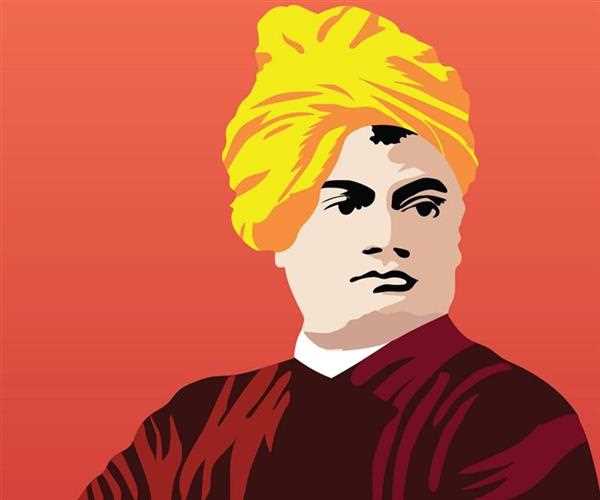
12-May-2023 , Updated on 5/12/2023 5:36:33 AM
Swami Vivekananda: The Life and Legacy of an Indian Spiritual Leader
Swami Vivekananda, born as Narendranath Datta, was one of India's greatest spiritual leaders, who played a pivotal role in introducing Hinduism to the western world. He was a key figure in the Indian independence movement and a leading exponent of Vedanta philosophy. Swami Vivekananda's teachings and legacy continue to inspire millions of people around the world today.
Early Life and Education
Swami Vivekananda was born on January 12, 1863, in Kolkata, India. He was the eldest son of Vishwanath Datta, a lawyer, and Bhuvaneshwari Devi. From a young age, he was known for his sharp intellect and exceptional memory.
Swami Vivekananda received his early education at the Metropolitan Institution School in Kolkata. He went on to study at the Presidency College, where he excelled in academics and extra-curricular activities. He was a voracious reader and was particularly interested in the works of Western philosophers such as Kant, Hume, and Mill.
Spiritual Journey
Swami Vivekananda's spiritual journey began in his youth when he met Sri Ramakrishna Paramahamsa, a renowned saint and mystic, who became his guru. Swami Vivekananda was deeply influenced by Sri Ramakrishna's teachings and spent many years studying with him. He developed a close bond with his guru and became his most devoted disciple.
Sri Ramakrishna taught Swami Vivekananda the philosophy of Vedanta, which holds that the ultimate reality is Brahman, the divine essence that underlies all existence. He also emphasized the importance of bhakti, or devotion, as a means to attain spiritual liberation.
Swami Vivekananda spent several years traveling across India as a wandering monk, seeking spiritual enlightenment. He lived a simple life, often sleeping on the streets and begging for food. During his travels, he witnessed the poverty and suffering of the Indian people, which had a profound impact on him. He established the Ramakrishna Mission in 1897 as a way to put these ideals into practice, and the organization has since grown to become one of the largest and most respected philanthropic institutions in India.
In 1893, Swami Vivekananda attended the Parliament of World Religions in Chicago, where he delivered a series of lectures on Hinduism. His speeches were a revelation to the western world, and he was hailed as a spiritual leader and philosopher. He went on to tour the United States and Europe, spreading the message of Vedanta and Hinduism.
Legacy
Swami Vivekananda's teachings and legacy continue to inspire millions of people around the world today. He was a champion of social reform and advocated for the upliftment of the Indian masses. He believed that education was the key to social transformation and founded the Ramakrishna Mission, a philanthropic organization that provides education and healthcare to the underprivileged.
Swami Vivekananda's teachings were rooted in the principles of Vedanta and emphasized the importance of self-realization and spiritual growth. He believed that every individual had the potential to attain spiritual enlightenment and that the purpose of life was to realize one's true nature.
One of Swami Vivekananda's most famous teachings is the concept of karma yoga, which holds that one should perform their duties selflessly, without expecting anything in return. He also emphasized the importance of meditation and self-discipline as means to attain spiritual enlightenment.
Swami Vivekananda's teachings had a profound impact on the Indian independence movement. He believed that India's spiritual heritage was its greatest strength and that it was through the revival of Indian culture and traditions that India could regain its independence.
Swami Vivekananda was a spiritual leader, philosopher, and social reformer who played a pivotal role in introducing Vedanta and Hinduism to the western world. His teachings continue to inspire millions of people around the world today,
Vivekananda's speech was a sensation, and he was soon in demand as a speaker and spiritual teacher. He spent several years traveling throughout the United States, giving lectures, meeting with scholars and religious leaders, and establishing Vedanta centers in several cities. He also wrote extensively, producing books and articles on topics ranging from meditation and yoga to Indian culture and philosophy.
Vivekananda died in 1902 at the age of just 39, but his legacy has lived on through his teachings, writings, and the many institutions that he helped to establish. He is revered as a spiritual leader, a social reformer, and a cultural icon, and his message of universalism and self-realization continues to inspire people around the world.
In conclusion, Swami Vivekananda was a visionary leader who played a key role in shaping the spiritual and cultural landscape of India and the world. His message of tolerance, unity, and spiritual self-realization continues to resonate with people of all backgrounds, and his ideas about education, self-reliance, and social reform have had a profound impact on Indian society. Vivekananda's life and legacy serve as an inspiration to all those who seek to create a better world, and his message of universalism and self-realization remains as relevant today as it was over a century ago.

SEO and Content Writer
I am Drishan vig. I used to write blogs, articles, and stories in a way that entices the audience. I assure you that consistency, style, and tone must be met while writing the content. Working with the clients like bfc, varthana, ITC hotels, indusind, mumpa, mollydolly etc. has made me realized that writing content is not enough but doing seo is the first thing for it.
Join Our Newsletter
Subscribe to our newsletter to receive emails about new views posts, releases and updates.
Copyright 2010 - 2026 MindStick Software Pvt. Ltd. All Rights Reserved Privacy Policy | Terms & Conditions | Cookie Policy